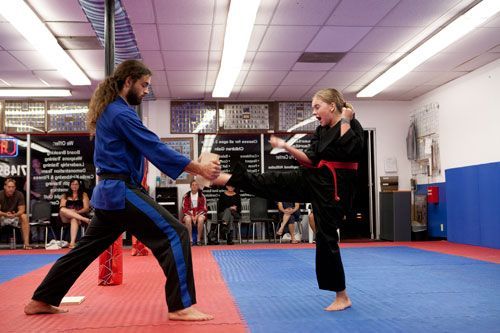Building Confidence and Resilience for Teens with Martial Arts
In the tumultuous journey of adolescence, teenagers face a myriad of challenges that shape their self-esteem, emotional resilience, and overall character. It's during these formative years that martial arts can emerge as a powerful ally in their personal development. Beyond the physical aspect of punches and kicks, martial arts equips teenagers with invaluable life skills, fostering confidence, mental resilience, discipline, and physical fitness. In this blog, we will delve into the specific benefits of enrolling teenagers in martial arts classes and how it can be a transformative experience for them.
1. Building Self-Confidence with Teen Self Defense
Teenagers often grapple with self-esteem issues as they navigate the complexities of peer pressure, body image concerns, and societal expectations. Martial arts provides a structured environment where teens can build and strengthen their self-confidence. Here's how:
- Skill Mastery: As teens progress through martial arts ranks and master techniques, they gain a sense of accomplishment that boosts their self-esteem.
- Positive Reinforcement: Instructors provide constructive feedback and encouragement, reinforcing the idea that improvement is possible with effort and dedication.
- Setting and Achieving Goals: Martial arts involves setting goals for belt promotions, which helps teenagers develop goal-setting skills and a sense of purpose.
2. Developing Mental Resilience
Life isn't always smooth sailing, and teenagers need resilience to weather the storms of adolescence. Martial arts training instills mental toughness in several ways:
- Facing Challenges Head-On: Teens encounter physical and mental challenges in martial arts, teaching them to confront and overcome adversity.
- Stress Management: Martial arts training encourages mindfulness and relaxation techniques, providing teens with tools to manage stress effectively.
- Learning from Failure: Failure is a part of martial arts. Teens learn that setbacks are opportunities for growth, which can be applied to other areas of life.
3. Cultivating Discipline
Discipline is a cornerstone of martial arts philosophy. For teenagers, who may struggle with time management and self-control, martial arts can instill valuable discipline:
- Routine and Structure: Martial arts classes follow a structured routine, teaching teens the importance of punctuality and consistency.
- Respect and Etiquette: Martial arts emphasizes respect for instructors, fellow students, and the art itself, fostering a sense of responsibility and courtesy.
- Goal-Oriented Practice: Discipline in martial arts is closely tied to achieving goals, reinforcing the importance of dedication and hard work.
4. Enhancing Physical Fitness
In an era of screens and sedentary lifestyles, physical fitness is a concern for many teenagers. Martial arts offers an engaging and fun way to stay active:
- Full-Body Workout: Martial arts involve a combination of aerobic and anaerobic exercises, promoting cardiovascular health, strength, flexibility, and balance.
- Healthy Habits: Teens who practice martial arts are more likely to adopt a healthier lifestyle, including improved diet and exercise habits.
- Self-Defense Skills: Learning self-defense builds confidence and ensures teens are better prepared to protect themselves if necessary.
5. Positive Outlet for Energy and Emotions
Teenagers often grapple with pent-up energy and emotions. Martial arts provides a constructive outlet:
- Stress Relief: Physical activity in martial arts releases endorphins, reducing stress and promoting a sense of well-being.
- Emotional Regulation: Teens learn to manage their emotions and develop emotional intelligence through training.
- Healthy Social Interactions: Martial arts classes encourage teamwork and camaraderie, helping teens forge positive relationships.
Martial arts for teenagers is more than just learning martial skills; it's a transformative journey that builds self-confidence, mental resilience, discipline, and physical fitness. It equips teens with essential life skills that will serve them well beyond the training mat, providing a positive outlet for the unique challenges they face during this pivotal stage of life. Whether your teenager is dealing with self-esteem issues, stress, or simply looking for a fun and constructive activity, enrolling them in martial arts classes can be a life-changing decision.
f you're local to Southern California, we invite you to take the first step towards empowering your teenager by trying a free class at American Tiger Martial Arts & Fitness. Our experienced instructors are dedicated to helping students of all ages develop self-confidence, mental resilience, discipline, and physical fitness.
Don't miss this opportunity to provide your teenager with the tools they need to thrive during their formative years and beyond. Join our martial arts community and embark on a journey of personal growth and empowerment.
Schedule your free class today and watch your teenager flourish!




